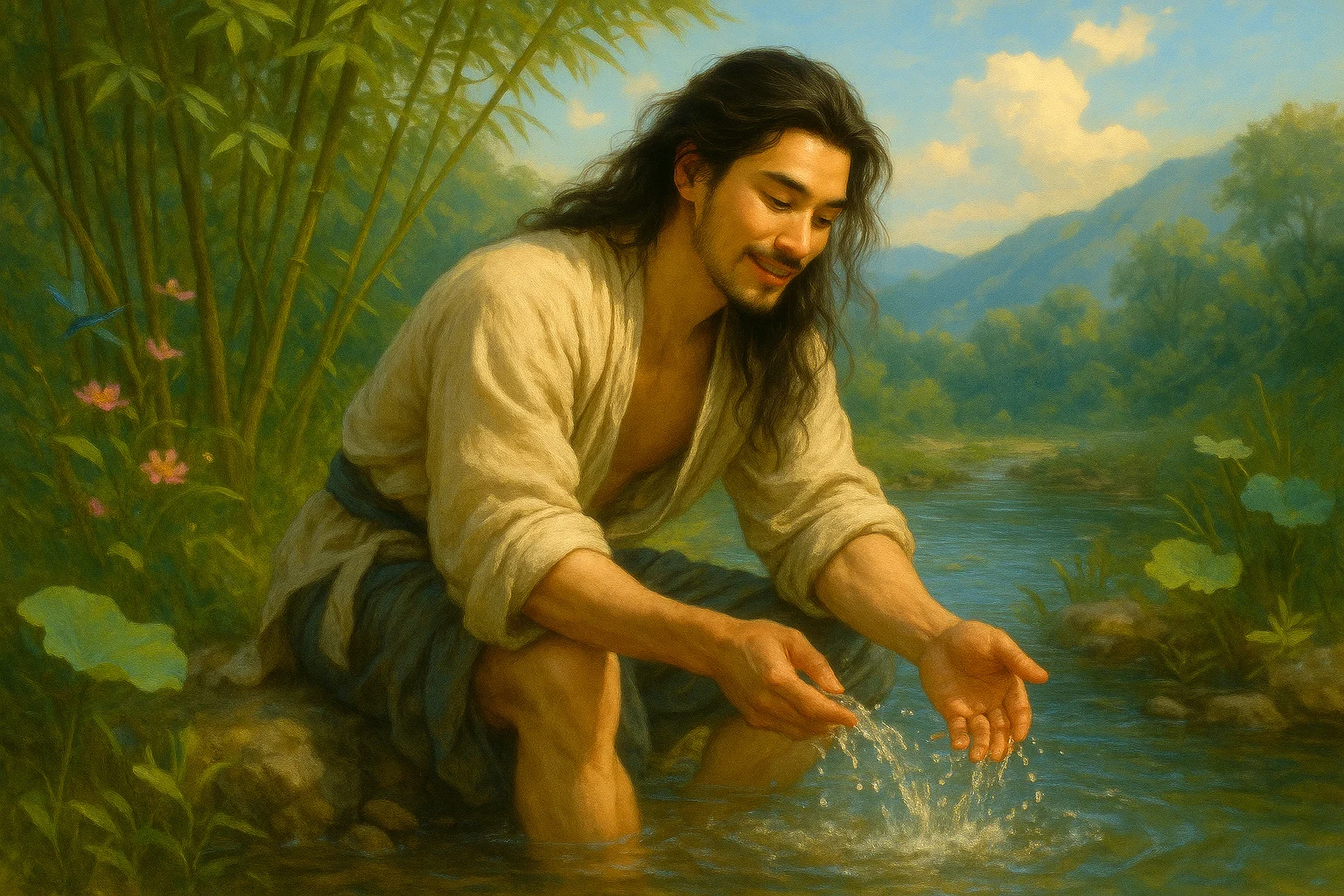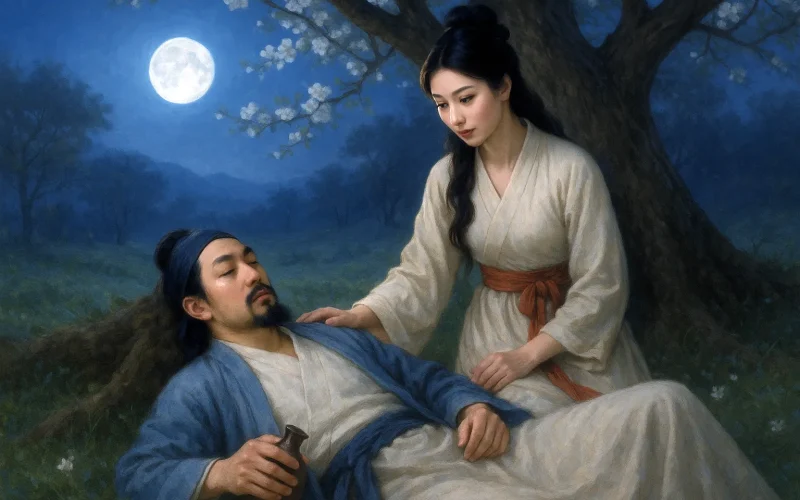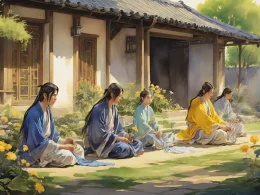A small dyke rises with Bohai's tidal sound,
Officials knew it before sea gulls could found.
If Penglai Isle had pathways to mortal's gate,
They'd yearly tax the purple mystic herbs of fate.
Original Poem
「新沙」
陆龟蒙
渤澥声中涨小堤,官家知后海鸥知。
蓬莱有路教人到,应亦年年税紫芝。
Interpretation
Lu Guimeng lived during the late Tang Dynasty, a time of court corruption, separatist warlords, intense power struggles between eunuchs and officials, and widespread social unrest. The ruling class imposed heavy taxes and levies, causing deep suffering among the people, many of whom struggled to survive. Though Lu remained a commoner throughout his life, he witnessed societal darkness and often used poetry to critique contemporary ills, satirizing the absurdity and greed of the court. "The New Sandbank" was written against this backdrop. Upon learning that the government had begun taxing even newly formed sandbanks along the coast, the poet employs extreme exaggeration and sharp irony to expose the insatiable nature of the ruling class.
First Couplet: "渤澥声中涨小堤,官家知后海鸥知。"
Bóxiè shēng zhōng zhǎng xiǎo dī, guānjiā zhī hòu hǎi'ōu zhī.
In the sound of the Bohai, a small levy rises;
The officials know it before the gulls do.
The line "the officials know it before the gulls do" is deeply ironic. Gulls, living by the sea for generations, are the most familiar with tides and the first to notice topographic changes—they should be the first to know. Yet the poet states that the officials knew earlier, satirizing their keen嗅觉 (xiùjué, sense of smell) for extracting taxes. The sandbank had just emerged, not yet fit for farming, and the people had not even begun to cultivate it, yet the government’s calculations were already underway.
Second Couplet: "蓬莱有路教人到,应亦年年税紫芝。"
Pénglái yǒu lù jiào rén dào, yīng yì nián nián shuì zǐzhī.
If a path to Penglai existed for men to reach,
They would surely tax its purple mushrooms every year.
The latter couplet shifts from reality to hypothesis, pushing the satire to its extreme. Penglai is a mythical abode of immortals, unrelated to worldly taxes, yet the poet imagines that if officials could access it, they would even tax its divine herbs. This absurd imagination reveals the government’s insatiable and omnipresent nature.
Holistic Appreciation
"The New Sandbank" is a quintessential satirical poem. The first two lines draw from reality, using the new sandbank as a pretext to imply the government’s urgency in exploitation; the latter two lines invent a fictional scenario, exaggerating to the point of taxing even the mythical Penglai, creating an absurd and ridiculous image. In just twenty-eight characters, the poem exposes the essence of the ruling class: boundless greed, absurd excess, and a willingness to tax even the illusory realms of immortals.
The poem employs extreme exaggeration and cold irony to lay bare the absurd reality, achieving an artistic effect of "revealing anger through laughter." It is not only one of Lu Guimeng’s representative satirical works but also exemplifies late Tang literati’s reflection and critique of a dark society.
Artistic Merits
- Exaggeration reveals truth through absurdity: The poem excels in exaggeration. Gulls, nature’s prophets, are less sensitive than officials; Penglai, a realm of myth, is imagined as taxable. Absurdity mirrors absurd reality.
- Biting satire, anger beneath laughter: Without directly stating official greed, it exposes the rulers’ laughable and despicable nature through scenes like "officials knowing before gulls" and "taxing divine mushrooms," delivering potent satire.
- Blending reality and fiction, layered progression: The first couplet depicts a real scene—a new sandbank immediately coveted; the second invents a fictional scenario—even fairy mountains cannot escape taxation. Moving from real to unreal, near to far, the satire deepens step by step with tight logic and structure.
- Concise language, profound meaning: Just four lines, plain and direct, yet rich in implication. Surface description veils political critique, with deep social criticism and care for the people behind simple words.
- Comedic presentation, tragic essence: The poet’s playful tone creates laughable situations, but beneath lies social tragedy—people’s unbearable suffering, where even new sandbanks are not spared. This "tragic core within a comedic shell" embodies the unique power of satire.
Insights
This work reminds us that literature is not only for celebrating nature or expressing personal feelings—it can also be a sharp tool for exposing social ills and criticizing injustice. Through concise and biting satire, Lu Guimeng lays bare the absurdity and greed of the government, warning later generations: any rule that ignores people’s suffering and only exploits will ultimately self-destruct. It also teaches us that true art often lies in tearing open the "absurdities taken for granted" and presenting them to the world, making people laugh while also provoking deep thought and vigilance.
About the poet

Lu Guimeng (陆龟蒙 ?– c. 881 CE), a native of Suzhou, Jiangsu, was a Late Tang dynasty writer and agronomist. After failing the imperial examinations, he retreated to a reclusive life in Puli, Songjiang. He formed a famous literary partnership with the poet Pi Rixiu, and the pair are often referred to collectively as "Pi-Lu." His poetry is known for its social satire and a style that is incisive yet subtly restrained. His inclusion in the Biographies of Talents of the Tangunderscores his significance. The modern writer Lu Xun famously praised his essays, noting that they provided "a sharp radiance piercing through a world of muddle". Lu Guimeng is regarded as a uniquely distinctive voice in the literary scene of the late Tang.












